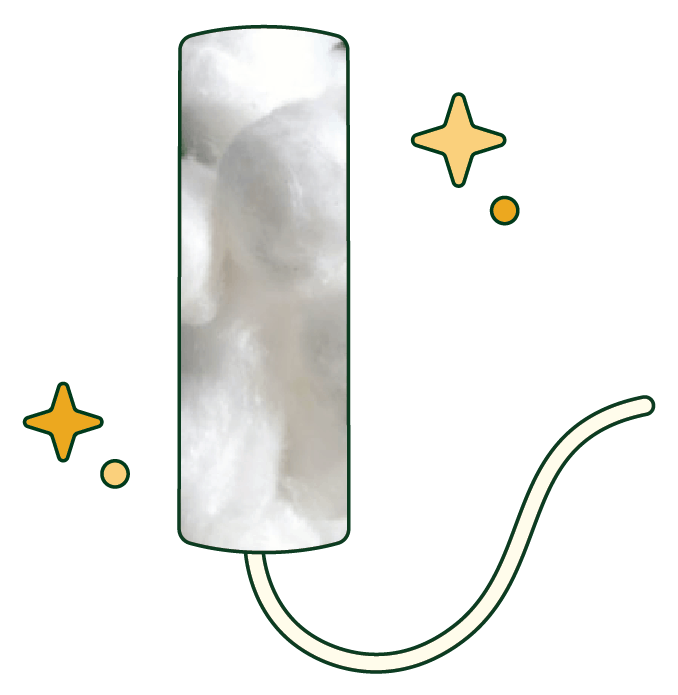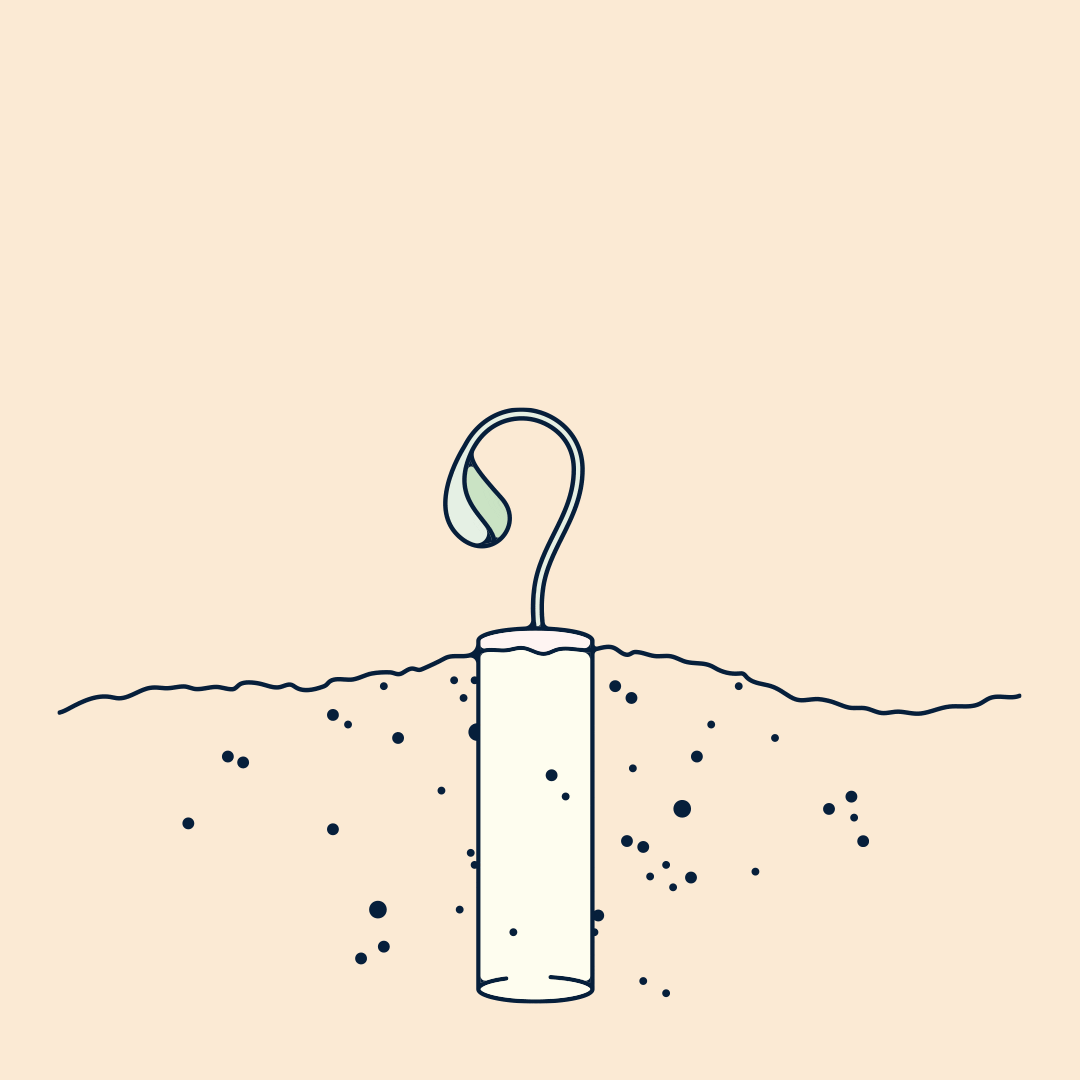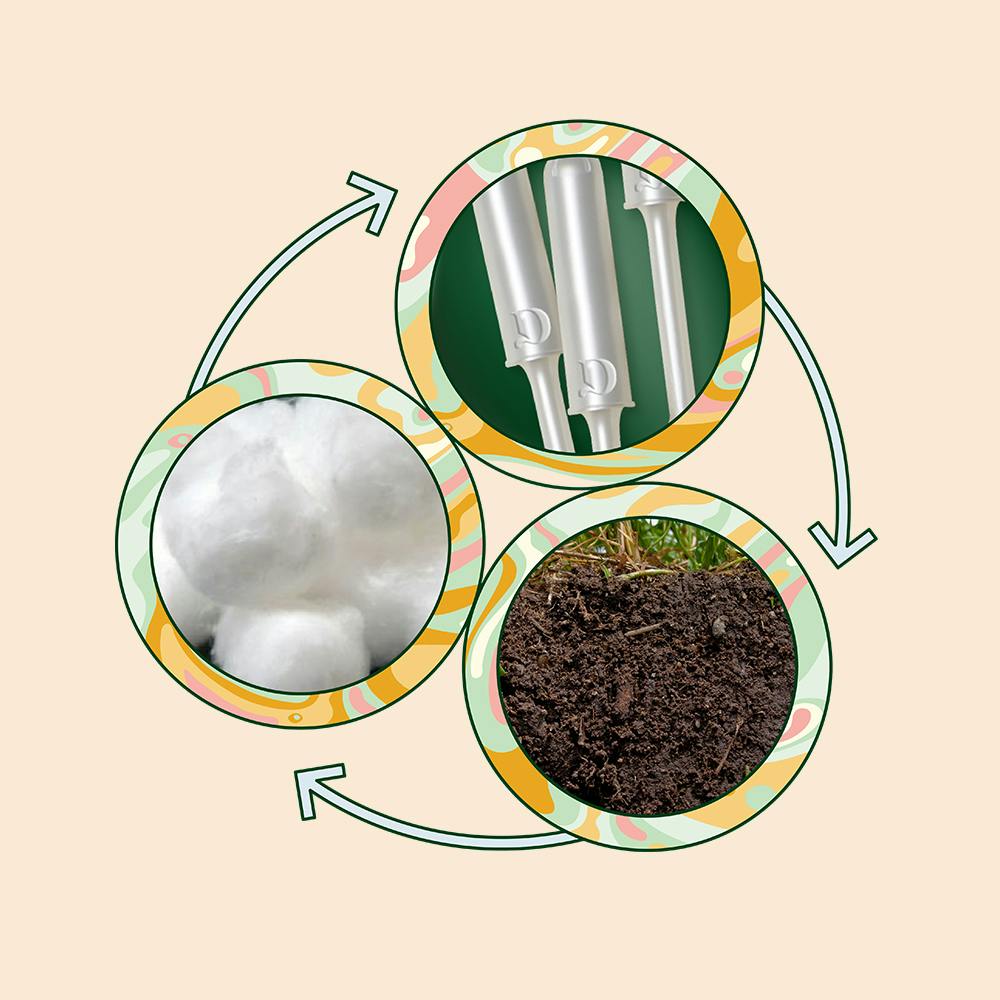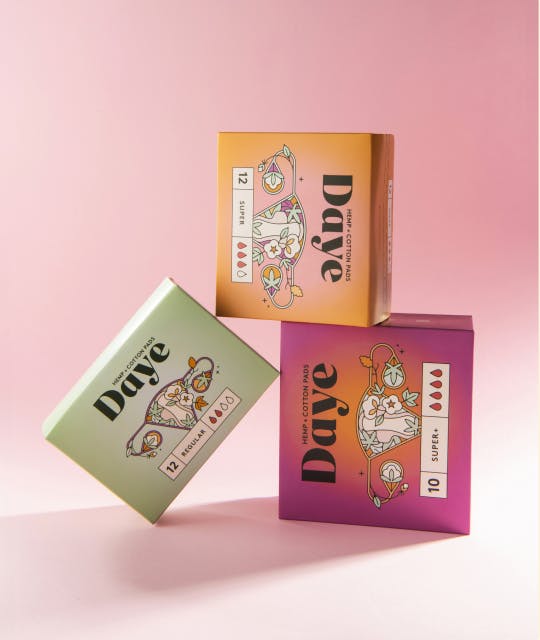Table of contents
1. It’s completely understandable if an “eco-period” is the last thing on your mind when you’re dealing with cramps, fatigue, mood swings and leaks.
2. The environmental effect of periods
3. What are most tampons made from?
4. Choose organic, biodegradable period products
5. Other tips for a more sustainable period
6. Managing your period is entirely your decision
Written by Liv Cassano
Illustrated by Erin Rommel
It’s completely understandable if an “eco-period” is the last thing on your mind when you’re dealing with cramps, fatigue, mood swings and leaks.
But periods aren’t just a burden on your mind and body: they’re also a burden on the planet. Thankfully, having more sustainable periods isn’t as hard as you’d think, and we’re here to shed some light on all the eco-friendly period products available.
The environmental effect of periods
The average woman goes through 11,000 disposable menstrual products in her life. These tampons, pads, liners and their packaging (most are made of plastic) contribute to the 200,000 tonnes of period waste generated in the UK each year.
All of this waste ends up in landfills, or polluting pollutes seas, rivers and beaches. In fact, in 2016, the Marine Conservation Society found 20 sanitary items per 100 metres of shoreline during a beach clean-up.
Periods aren’t great for the environment, but people who menstruate rely on sanitary products month in, month out. How can we ensure a human necessity that doesn’t destroy the planet?
Stop flushing period products
Did you know around half of the women in the UK flush their tampons? Tampons are made to absorb moisture, so they don’t break down in water like toilet paper does, contributing to the 370,000 sewage blockages in the UK every year, to the point where they’re reshaping the banks of the Thames and polluting the water.
Used tampons and pads aren’t recyclable once soiled with menstrual blood, so how should you dispose of them?
By law, all businesses in the UK are legally required to provide sanitary waste bins in their bathrooms, but these either end up in landfill or are incinerated (which releases greenhouse gases).
What are most tampons made from?
97% of tampons on the market today are made of rayon (a non-biodegradable plastic) or non-organic cotton, which is grown with pesticides that damage soil composition and contaminate water.
The packaging matters, too
Although disposable sanitary products get a lot of stick, the boxes and wrappers they come in also plays a huge role in landfill waste. If you can, opt for period care that uses sustainable packaging.
However, when your period comes early – and you’re frantically looking for the closest shop that sells tampons –we know that biodegradable packaging isn’t at the top of your list!
The first step toward an eco-friendly period is to switch to plastic-free, biodegradable tampons and other period products.

Choose organic, biodegradable period products
A simple swap to organic period products – like Daye tampons – is the easiest way to reduce pollution! Daye tampons are made from 100% certified organic, unbleached and sustainably-sourced cotton fibres.
We even lab-test our cotton to ensure there is no trace of chemicals, heavy metals or GMOs.
Are Daye tampons compostable?
Since Daye tampons are made of 100% organic cotton, they’re biodegradable in standard landfill conditions, and they’re also compostable. If you feel like home-composting your used tampons, go for it!
If not, at the very least you can rest easy knowing that – in standard landfill conditions – Daye tampons biodegrade within 12 weeks.
We want to leave an impact (not a trace) so we spent a lot of time conducting material innovation and analysing the life-cycle of our sustainable packaging. This includes bio-based sugarcane applicators, water-soluble paper wrappers, a compostable refill pouch and recycled paper mailers.

Other tips for a more sustainable period
Some methods for a greener period green is to cut back on waste and switch to reusable options.
Not every eco-period option is doable for everybody, from affording organic tampons to inserting menstrual cups to wearing underwear soaked in menses. It’s not helpful to glorify one product over another – or criticising people for the period care solution they choose. How you manage your period is entirely your decision.
Reusable pads & period-proof underwear
Pads and panty liners have a higher carbon footprint than tampons because of the plastic adhesive that allows them to stick to your underwear. If you’re accustomed to using pads, a greener alternative is reusable pads or period-proof underwear.
Menstrual cups
For those whose flow is too heavy for pads to handle, menstrual cups (made from body-safe silicone or latex rubber) might be a good option. They last up to 10 years and hold 12 hours worth of period blood, which means you don’t have to go through as many.
Applicator-free tampons
If you’d rather stick to your trusty tampon – but still want to cut back on waste – you can swap your applicator tampons for applicator-free ones and use a reusable applicator instead.
Use nothing at all
Free bleeding is admittedly a contentious solution, but it doesn’t require any sanitary products (whether disposable or reusable).
If you have a very light flow and don’t mind staining your underwear, there’s really no reason why you can’t omit period products entirely – as long as you don’t mind the extra load of laundry.
Do all of the above
Having an eco-friendly period doesn’t have to be all or nothing. Small changes here and there make a difference in the long run, so you can mix and match period care.
The key to having a more sustainable period is to be mindful of what products you’re using.
Managing your period is entirely your decision
At Daye, we believe that the onus of sustainability shouldn’t fall entirely on the consumer, but rather brands and manufacturers.
That’s why we continuously invest in research and development to increase our sustainability standards, and offer products that are good for your body and the environment.
Everyone should do what is best for their body and lifestyle, but if you can’t have a more eco-friendly period, our advice would be to up your sustainability quota by switching it up in another area of your life.
“
How you manage your period is entirely your decision.
TL;DR
- If you want to cut back on waste, reusable sanitary products (like menstrual cups and period-proof underwear) might be great solutions.
- Remember not to flush tampons!
- Do what feels best for your body and lifestyle. If this means sticking to your tried-and-tested period care routine, there’s no shame in that. Try adopting more sustainable options in other areas of your life.
- Organic, biodegradable and plastic-free disposable menstrual products (like Daye tampons) are an easy, eco-friendly alternative to mainstream period care.






